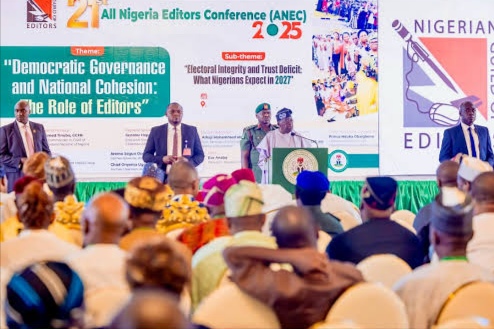Media Responsibility In Safeguarding Nigeria’s Image: Insights From The 21st Editors Conference
EMMANUEL PETER ADAYEHI PhD

President Bola Ahmed Tinubu’s address at the 21st All Nigeria Editors Conference (ANEC 2025) highlighted the importance of responsible journalism in shaping Nigeria’s image. He emphasized that social media has made everyone a potential publisher, increasing the risk of misinformation and threatening national cohesion.
Key Points from President Tinubu’s Speech:
– Responsible Journalism: Tinubu urged editors to center their reporting on truth, fairness, and national interest.
– Social Media Risks: He warned that unchecked social media use can destabilize the country and undermine democracy.
– Economic Reforms: Tinubu reaffirmed his administration’s commitment to economic stability and prosperity.
The Role of ANEC in Media Ethics
Building on the significance of responsible journalism, the 21st All Nigeria Editors Conference serves as a vital platform for discussing media ethics and challenges in contemporary Nigeria. Addressing its significance can enrich the conversation surrounding media responsibilities and the nation’s image.
Addressing Governance Challenges
To promote accountability and transparency, several solutions can be implemented:
– Creating Transparent Systems: Implementing technology-driven solutions for governance that enhance transparency in public spending and open data initiatives can aid accountability.
– Promoting Media Literacy: Establishing programs to educate both journalists and the public on media ethics and responsible reporting can combat misinformation.
– Strengthening Legal Protections: Enforcing laws that protect journalists from harassment would promote a freer press environment.
– Constructive Criticism: While criticisms of governance are necessary, it’s equally vital to suggest actionable steps, such as engaging the media in dialogue with government entities to identify common goals for national progress.
Questions for Further Discussion
Furthermore, several questions arise from the discussions at ANEC, including:
– What specific reforms would you propose to address corruption and improve governance in Nigeria?
– How can the media and government collaborate to promote transparency and accountability?
– What role can citizens play in demanding accountability and responsible governance from their leaders?
– How can editors navigate the challenges of social media while maintaining journalistic integrity?
– In what ways can the public be educated to distinguish between credible news and misinformation?
– How can international stakeholders assist Nigeria in fostering better governance and media practices?
The Need for Accountability
In light of these discussions, the writer addresses a pressing issue raised by the World Bank about systemic failures in President Tinubu’s administration, particularly the conditional cash transfer program’s inadequacies. This highlights how irresponsible systems use social media as a scapegoat for media misconduct, negatively affecting Nigeria’s global image. Nigerians must demand accountability and transparency from their leaders. The media plays a pivotal role in promoting responsible governance and holding those in power accountable. It’s essential for the media to hold leaders responsible for good governance in Nigeria.
Holding Leaders Accountable
Consequently, President Bola Ahmed Tinubu should not deflect blame onto journalists for the country’s dismal image, especially when recent events, like the Deputy Speaker’s conduct in the House of Representatives, reflect broader issues of negligence among Nigerian leaders. The World Bank’s claims that over 56% of funds from the conditional cash transfer program have failed to reach intended recipients raises serious questions about corruption and governance. As President Tinubu’s administration continues to grapple with challenges of transparency—evidenced by investigations into student loans and increasing international borrowing—the need for accountability becomes ever more urgent.
Moving Forward
In conclusion, it is essential to emphasize the pressing need for reforms in Nigeria’s governance and media practices. Stakeholders must collaborate to safeguard the nation’s image and pursue responsible governance. Together, the media and government must work towards fostering transparency and accountability for a better future.
– Emmanuel Peter Adayehi
Lagos/Nigeria









